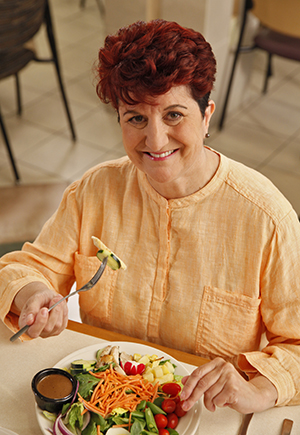Making Your Lifestyle Heart-Healthy
Everyone can benefit from making healthy choices in their day-to-day lives. This is especially true for the millions of Americans diagnosed with heart and vascular diseases.
Follow a healthy diet

Eating a healthy diet is a proven way to reduce the risk for heart disease. These are elements of a heart-healthy diet (amounts listed are for adults):
-
Eat fresh fruits and vegetables every day. About half of your overall diet should be fruit and vegetables.
-
Limit saturated and trans fats by using olive oil or other vegetable oils instead of butter or margarine. Consume less than 10% of calories per day from saturated fats.
-
Eat a variety of protein foods. Meat and poultry should be lean or low-fat, such as skinless chicken breasts. Stay away from processed meats. They are loaded with preservatives, sodium, and sugars.
-
Make half of your grains whole grains. This includes oatmeal, brown rice, whole-grain bread, and whole-grain cereal.
-
Get enough dietary fiber per day. Try to get 14 grams of fiber for every 1,000 calories you consume. Dietary sources of fiber include fruits, vegetables, breakfast cereals, bran, whole-wheat products, beans (legumes), and nuts.
-
Limit or eliminate fast foods. These are often loaded with salt, sugar, and fats. Consume less than 10% of calories per day from added sugars. For a 2,000-calorie-per-day diet in active people, less than 10% of daily calorie intake is equal to 200 calories a day or 50 grams of sugar in 1 day. If you keep a food diary, you can see that this adds up fast, as sugar is often substituted for fat to add flavor.
-
If you drink alcohol, do so only in moderation. That means no more than 2 drinks a day if you're a man and 1 if you're a woman.
-
Limit your salt (sodium) intake to 2,300 mg per day. Foods that are frozen or canned tend to have more sodium. This is to extend the shelf life and add flavor. Using raw ingredients to cook can help you control the amount of sodium in your food. If you have high blood pressure or another heart condition, your healthcare provider may advise limiting sodium intake to less than 1,500 mg per day.
-
Move to fat-free or low-fat milk or dairy products (or soy, rice, or almond milk for people who can’t tolerate lactose).
Nutritional needs depend on your age, sex, height, weight, and physical activity. They can also depend on whether you are pregnant or breastfeeding. For more information on your nutritional needs, visit www.myplate.gov.
Exercise more
Regular exercise keeps your heart and the rest of your body in shape. Here are some ways to add more activity to your life:
-
Check with your healthcare provider before starting an exercise program. This is especially important if you have not been active. Or if you have a chronic disease.
-
Start slowly and increase your activity gradually. Experts advise at least 150 minutes of moderate-intensity physical activity or 75 minutes of vigorous-intensity physical activity per week for substantial health benefits. For instance, you can do 30 minutes of moderate-intensity physical activity 5 days a week.
-
Do strength training exercises 2 or more times per week. Work all major muscle groups.
Stop smoking
Smoking is a major risk factor for heart disease. Here's how to live smoke-free:
-
Decide to quit and set a quit date. If you fail, try again. Successful quitters often tried many times before they were able to quit.
-
Ask your healthcare provider for information about aids to help you stop smoking. These can include a nicotine patch or inhaler, medicines, and a counseling or support program.
Reduce your stress
Constant anger and stress can damage your heart. Try these tips to better cope with life's pressures:
-
Try to be positive instead of negative in your outlook on life.
-
Take 15 to 20 minutes a day to sit quietly and breathe deeply.
-
Take time for yourself each day. Read a book, listen to music, or enjoy a hobby.
-
Get regular exercise. Exercise is a great way to relieve stress. Yoga and tai chi are good activities for improving flexibility and easing stress.
-
Drink more water. Also cut back on caffeine. Doing these things can reduce the physical stress on your body if you are sensitive to caffeine.
Monitor your health
Take charge when it comes to your heart's health. To do so, work with your healthcare provider to reduce your heart disease risk by following up with them for advised treatments. These may include treatment for high blood pressure and cholesterol levels.